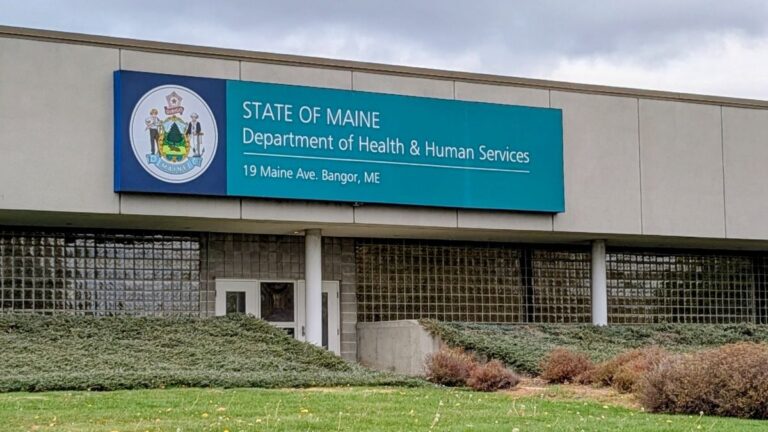A multi-million dollar deal to overhaul Maine’s troubled criminal public defense system passed the state House and Senate on Thursday in rebuke of Gov. Janet Mills, who has resisted adding money to a system that government and press reports say is failing poor defendants.
Staffing and money shortages have plagued the Maine Commission on Indigent Legal Services, or MCILS, which is responsible for providing lawyers to adults and juveniles charged with crimes who cannot afford to hire their own attorneys. The $21.8 million package will raise wages for lawyers, open a public defender office and add new state employees, but politicians say it is the first step in a long reform process.
For Sen. Lisa Keim (R-Dixfield), the legislation is years in the making and a “good start” to the overhaul MCILS needs, she said. In 2017, Keim chaired a bipartisan committee to study MCILS. Since then she has advocated for change as government reports, independent studies and press investigations uncovered problems with the agency’s finances and the quality of lawyers it hired.

“I agree with this step because it’s measured,” Keim said. “Measured action that maybe doesn’t get us where we need, but Rome wasn’t built in a day.”
During a marathon voting session that started Wednesday night, the House voted to pass the reforms at about 1:30 a.m. Thursday morning. The Senate picked up the bills 12 hours later and voted unanimously in support of the proposals. Before becoming law, the bills must secure funding from the budget committee and avoid a veto by Mills.
Keim said she was excited but uncertain of the bills’ fates. MCILS currently has a two-year budget of $35.2 million. The reform package will enable the agency to better advocate for itself by adding employees who will increase accountability in training, supervision and finances — sticking points for the governor, Keim said. Mills’ support for the planned investment is far from certain.
A spokesperson for Mills gave no indication whether she intends to veto or sign the bills.
Maine is the only state that operates a public defense system that relies exclusively on private defense attorneys.
In the decade since the Legislature formed MCILS, the agency has repeatedly contracted with attorneys who were convicted of crimes or had histories of professional misconduct, according to an investigation by The Maine Monitor and ProPublica last year. One lawyer continuously solicited his client for sex while working as her court-appointed attorney, the news organizations found. Scores of private defense lawyers also violated state rules by accepting at least 2,000 case assignments to serious and complex cases they were not eligible to work on, another investigation by the news organizations found earlier this year.
MCILS is run by four people who oversee more than 300 private attorneys statewide. Its leaders are not able to provide direct supervision of attorneys in the courtroom or devote staff to training and auditing the lawyers.
The ACLU of Maine is expected to file a lawsuit challenging how Maine provides legal services to its poor. Its chief counsel, Zach Heiden, said lawmakers’ bipartisan commitment to fixing the state’s criminal defense system was a positive development but ultimately inadequate to fix lawyer shortages or deficiencies in oversight and training at MCILS.
“These bills are a good step but they’re not enough. None of them go far enough to address what’s wrong with Maine,” Heiden said.
In the next two years, $3.2 million will be used to open the state’s first trial-level public defender office in Kennebec County. It is expected to handle 80 percent of criminal cases in the county, while local attorneys will continue to be appointed to cases where there are conflicts or other legal matters MCILS handles, such as child protection, juvenile and mental health cases.
Adding public defender offices is the solution to growing caseloads and a shrinking pool of defense attorneys in Maine, said Bob Cummins, 88, who has defended indigent clients for nearly six decades and serves on the commission that oversees MCILS. Cummins is an avid supporter of public defender systems, and may apply to be the chief public defender of the proposed office.
“It is a step in the only direction that the state can go if it is going to solve and provide adequate services for the needs of the indigent defendants in this state,” Cummins said. “I’m elated. It’s not the complete solution to the problem, but it’s a beginning.”
There is more work to be done, including a “desperately needed” public defender office that handles appeals, said Rep. Jeffrey Evangelos (I-Friendship). The office was slashed, then cut completely from the bills this year.
Lawyers also need higher wages to cover overhead costs of running their practices while defending Maine’s poor, Evangelos said. Defense attorneys statewide will see their hourly wage increase from $60 to $80 an hour under the passed legislation. Proponents say $100 an hour or more is needed.
“It’s still inadequate funding,” Evangelos said. “It’s a start and hopefully we can build on it by demonstrating the system is working.”








